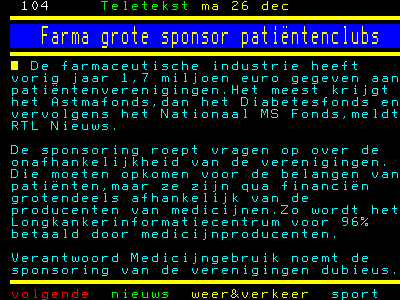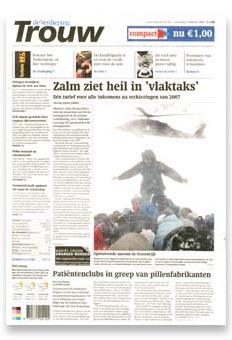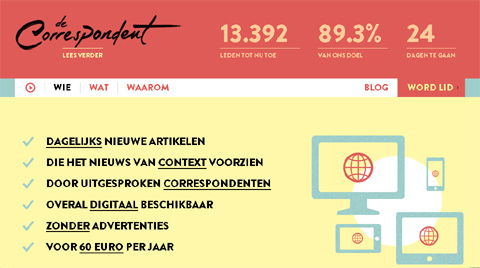* verscheen ook als boeklogje
De Waarheid was de eerste landelijke krant in Nederland die op tabloid-formaat uitkwam. Dat was in 1986. En het dagblad kreeg daarop meteen de bijnaam De halve waarheid. Erg lang zou de polder-Pravda overigens niet blijven verschijnen na deze metamorfose. De tijd voor Communistisch gekleurd commentaar was geweest. In welk formaat ook.
Tabloid, of gewoon A3, was nog weer eerder het formaat voor huis-aan-huisblaadjes en andere reclamekrantjes.
Studentenkrantjes hadden dit formaat, niet te vergeten. En, de gratis dagbladen die in het openbaar vervoer rondslingeren. Metro. Sp!ts.
En mede omdat in nabije buitenlanden slechts de boulevardpers op A3 uitkwam, werd tabloid door de redacties van de landelijke dagbladen hier als inferieur gezien. Tot 2004. Toen Het Parool ertoe overging. Al snel gevolgd door Trouw en het AD.
Op dit moment, 7 maart 2011, is het al eenvoudiger geworden om de Nederlandse kranten te noemen die nog wel als broadsheet verschijnen. De Telegraaf is nog een A2, en zal dit vast nog even blijven. Koppen in mijnrampletters maken op een A3tje lang zo veel indruk niet.
Met de Leeuwarder Courant is nog een tafel te vullen; maar met de bijlagen daarvan ook al niet meer.
Sinds vandaag is NRC Handelsblad over naar tabloid. Hoewel dat nooit zou gebeuren. De redactie kon ook niet nalaten groot nieuws van de tranformatie te maken; wat andere websites prompt flink wat materiaal opleverde om te persifleren.
Door een merkwaardig toeval volgt boeklog al sinds 2005 de ontwikkeling van de almaar krimpende krant — of de voorkeur van dagbladen voor het A3-formaat om hun uitgaven nog wat te laten lijken. Dus moet dit nieuwsfeit van vandaag wel meegenomen worden. Om de reeks compleet te houden, tot er geen krant meer op papier verschijnt.
Op een maandagkrant is alleen nauwelijks te knagen. Nu ja, Ian Buruma schrijft over de revoluties in Noord-Afrika, en Obama’s reacties daarop. Maar in zulke actuele opiniestukken vond ik Buruma nu net nooit heel sterk.
Verder staat er vooral sport in een maandagkrant, zelfs al is vrijwel alles daarover op zaterdag of zondag al bekend. Maar goed, wie NRC Handelsblad leest om zijn sportverslaggeving kan geen liefhebber zijn. De krant lijkt nooit van harte aandacht aan het onderwerp te besteden.
Men kan aan het eind van de middag eens kijken wat er zo meteen op televisie is in de krant. Dat heeft misschien nut.
En op maandag stonden er vroeger nog weleens recensies in de krant, van voorstellingen, festivals, of films. In de hernieuwde NRC konden er nog net twee pagina’s vanaf met aandacht voor de kunsten. Waarbij de meeste aandacht uitging naar Victor en Rolf; die volgens mij mode-ontwerpers zijn die tegenwoordig vooral prêt-à-porter maken, en dus op de pagina’s economie thuishoren.
Interessante vraag zou trouwens nog zijn of de beurskoersen nog terugkomen in de kleine krant.
In december heb ik overigens nog uitgebreid toegelicht NRC Handelsblad niet meer te blieven, in welk formaat ook. Wat ik nieuws acht, staat er te zelden in.
* NRC Handelsblad is vandaag eenmalig gratis online te lezen
NRC Handelsblad
maandag 7 maart 2011
48 halve pagina’s
Jaargang 41 no. 133
NRC Handelsblad BV













